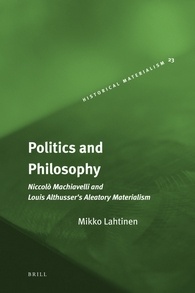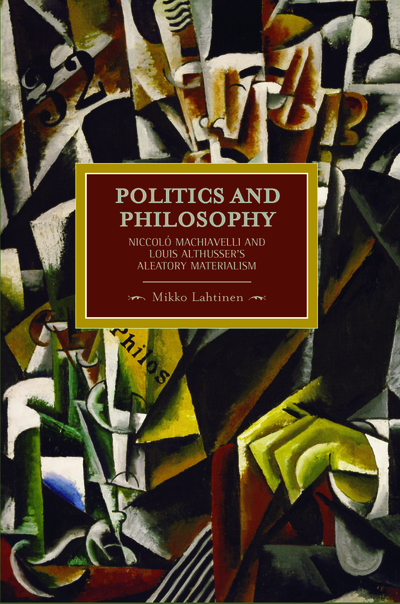Mikko Lahtinen, University of Tampere. Translated by Gareth Griffiths and Kristina Köhli
Louis Althusser’s interpretation of Niccolò Machiavelli has never really been studied in any detail as an analysis of political action and intervention. The same is also true for Althusser’s notion of aleatory materialism. Instead, these have conventionally been studied from the viewpoint of a philosophical perspective in which politics is excluded. The objective of the present book thus runs against many of the prevailing views on Althusser. Here the emphasis is placed on Althusser’s advancement of a theory of materialist politics. The main argument put forward is that, for Althusser, it was essential to reflect on how the conjunctural understanding of history and reality could offer a theoretical starting point for a subversive political strategy.
Biographical note
Mikko Lahtinen, Soc.Sc.D. (1997) in Political Science, University of Tampere (Finland), Ph.D. (2006) in History of Ideas, University of Oulu (Finland), is Associate Professor of Political Science at University of Tampere. He has published widely on the history of political philosophy and on political theory.
Readership
All those interested in political philosophy, Renaissance thought and Machiavelli or the Marxist theory and radical thought, as well as philosophers and social scientists.
Table of contents
Foreword
Author’s Preface to the English Edition
Chapter 1 Introductory Comments
1.1 Althusser, Machiavelli and political theory
1.2 Althusser’s contribution to Machiavelli scholarship
1.3 The approach of the present study
Chapter 2 A Critique of Hegelianism
2.1 A critique of Hegelian dialectics
2.2 Althusser’s Marxism
2.3. Althusser’s self-criticism
2.4. The ‘Machiavellian’ Lenin
Chapter 3 Aleatory Materialism
3.1. Prologue: Machiavelli’s solitude
3.2. The underground current of the materialism of the encounter
Chapter 4 Althusser’s Aleatory Machiavelli
4.1. A preliminary schema: the two dimensions of Machiavelli’s differentia specifica
4.2. Machiavelli’s differentia specifica in the history of political thought
4.3. The praxis of The Prince: the text as a political act
4.4. The praxis of the prince: the aleatory truth
4.5. The praxis of the prince: the project and strategy of the new prince
4.6. Epilogue: Althusser’s interpretation of Machiavelli
Chapter 5 The Subversive Machiavelli
5.1. The art of war and the art of politics
5.2. The destructive current of fortuna
5.3. The aspects of fortuna
5.4. Lady fortuna and the young men
5.5. The rise and fall of Cesare Borgia
5.6. ‘A stable people’
5.7. Epilogue: Machiavelli and the taming of chance
Chapter 6 Conclusion
References
Index


